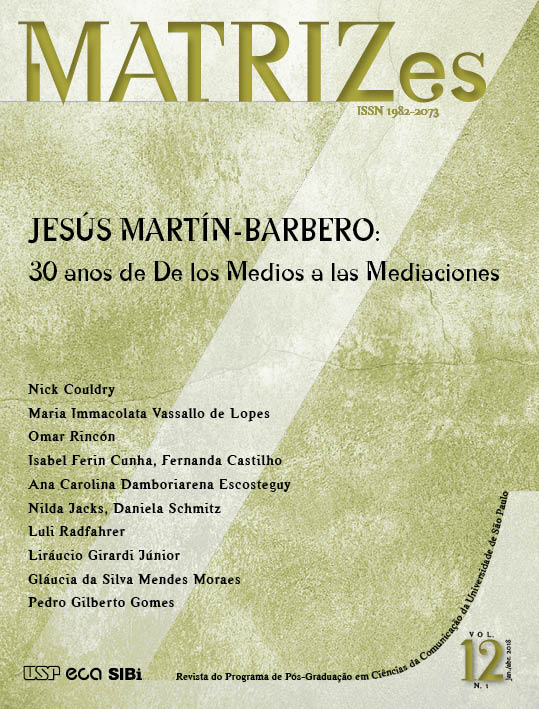O meio é a mediação: uma visão pós-fenomenológica da mediação datacrática
DOI :
https://doi.org/10.11606/issn.1982-8160.v12i1p131-153Mots-clés :
Pós-fenomenologia, estudos tecnológicos, cultura digital, epistemologia da comunicação, datacraciaRésumé
À medida que inovações tecnológicas transformam os processos da comunicação, a Teoria das Mediações de Jesus Martín-Barbero continua a ter importância nos debates epistemológicos a respeito do ambiente da comunicação em redes interativas. Mídias sociais, que, de acordo com a abordagem pós-fenomenológica, são dotadas de intencionalidade e agência moral, tornam-se as mediações preferenciais da comunicação contemporânea, transformando ambientes coletivos em datacracias, regimes em que bases de dados e algoritmos têm grande influência sobre a tomada de decisão. A Teoria das Mediações, ao evidenciar a importância da natureza comunicativa da Cultura, mostra-se essencial na identificação da influência da comunicação na formação ideológica contemporânea.
##plugins.themes.default.displayStats.downloads##
Références
ASIMOV, I. The caves of steel. New York: Doubleday, 1954.
BENJAMIN, Walter. The work of art in the age of its technological reproducibility and other writings on media. London: Harvard University Press, 2008.
BOGOST, I. The cathedral of computation. The Atlantic, Washington, D.C., 15 jan. 2015. Disponível em: <https://goo.gl/q1snJz>. Acesso em: 27 ago. 2017.
BREY, P. From moral agents to moral factors: the structural ethics approach. In: KROES, P.; VERBEEK, P. (Eds.). The moral status of technical artefacts. Dordrecht: Springer, 2014. p. 125-142.
CANCLINI, N. G. Culturas híbridas. 4. ed. São Paulo: Edusp, 2003.
ECO, U. Obra aberta: forma e indeterminação nas poéticas contemporâneas. São Paulo: Perspectiva, 1979.
GIBSON, W. Neuromancer. New York: Ace Books, 1984.
HABERMAS, J. Knowledge and human interests. Boston: Beacon Press, 1968.
HEIDEGGER, M. The question concerning technology & other essays. New York: Garland, 1977.
INTRONA, L. D. Towards a post-human intra-actional account of sociomaterial agency (and morality). In: JOHNSON, C. The information diet. San Francisco: O’Reilly Media, 2015. p. 31-53.
JASPERS, K. The atom bomb and the future of man. Chicago: University of Chicago Press, 1961.
KELLY, K. What technology wants. New York: Penguin Group, 2010.
KING, S. Under the dome. New York: Scribner, 2009.
KROES, P.; VERBEEK, P. (eds.). The moral status of technical artefacts. Dordrecht: Springer, 2014.
LATOUR, B. Reassembling the social: an introduction to actor-network theory. New York: Oxford Press University, 2005.
LUEPNITZ, D. Schopenhauer’s porcupines: intimacy and its dilemmas: five stories of psychotherapy. New York: Basic Books, 2003.
MANOVICH, L. The algorithms of our lives. The Chronicle of Higher Education, Washington, D.C., 16 dez. 2013. Disponível em: <https://goo.gl/oAvjTK>. Acesso em: 27 ago. 2017.
MARTÍN-BARBERO, J. Dos meios às mediações: comunicação, cultura e hegemonia. Rio de Janeiro: Editora da UFRJ, 1997.
______. As formas mestiças da mídia: entrevista concedida a Mariluce Moura. Revista Pesquisa Fapesp, São Paulo, n. 163, p. 10-15, set. 2009.
MCLUHAN, M. Understanding media: the extensions of man. London: MIT Press, 1994.
MOROZOV, E. To save everything, click here. New York: PublicAffairs, 2013.
MUMFORD, L. Technics and civilization. Chicago: University of Chicago Press, 2010.
PARISER, E. The filter bubble: what the Internet is hiding from you. New York: Penguin Press, 2011.POSTMAN, N. Technopoly: the surrender of culture to technology. New York: Vintage Books, 1993.
RAGON, M. Histoire de la littérature proletarienne en France. Paris: Albin Michel, 1974.
TAYLOR, F. Princípios de administração científica. 8. ed. São Paulo: Atlas, 2010.
VERBEEK, P. Some misunderstandings about the moral significance of technology. In KROES, P., VERBEEK, P. (Eds). The moral status of technical artefacts. Dordrecht: Springer, 2014. p. 75-88.
WEBER, M. The sociology of religion. Boston: Beacon Press, 1971.
ZHAO, J. et al. Men also like shopping: reducing gender bias amplification using corpus-level constraints. In: CONFERENCE ON EMPIRICAL METHODS IN NATURAL LANGUAGE PROCESSING, 2017, Copenhagen. Proceedings... 2017. Disponível em: <https://goo.gl/K3abry>. Acesso em: 28 ago. 2017.
Téléchargements
Publiée
Numéro
Rubrique
Licence
Les auteurs qui publient dans ce journal acceptent les termes suivants:
- Les auteurs conservent le droit d'auteur et accordent à la revue le droit de première publication, le travail étant concédé simultanément sous la licence Creative Commons Attribution (CC BY-NC-SA 4.0) qui permet le partage de l'œuvre avec reconnaissance de la paternité et de la publication initiale dans cette revue à des fins non commerciales.
- Les auteurs sont autorisés à assumer des contrats supplémentaires séparément, pour une distribution non exclusive de la version de l'ouvrage publiée dans cette revue (par exemple, publication dans un référentiel institutionnel ou en tant que chapitre de livre), avec reconnaissance de la paternité et de la publication initiale dans cette revue.






















